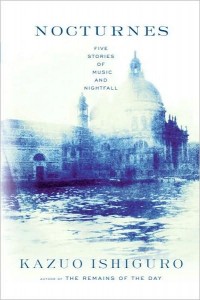 I admit it…I thought I had Kazuo Ishiguro figured out. It’s tempting to relegate even a great writer to a comfortable shelf in the mind. Even his foray into speculative fiction in the acclaimed 2005 novel Never Let Me Go can be linked to his reputation as a quiet archeologist of psychic devastation. But his latest book–which is also his first story collection, Nocturnes: Five Stories of Music and Nightfall (Knopf, 2009)– transcends any simple categorization.
I admit it…I thought I had Kazuo Ishiguro figured out. It’s tempting to relegate even a great writer to a comfortable shelf in the mind. Even his foray into speculative fiction in the acclaimed 2005 novel Never Let Me Go can be linked to his reputation as a quiet archeologist of psychic devastation. But his latest book–which is also his first story collection, Nocturnes: Five Stories of Music and Nightfall (Knopf, 2009)– transcends any simple categorization.
In “Come Rain or Come Shine,” the second story in Nocturnes, we meet Raymond, a connoisseur of American Broadway tunes whose long-term ‘friends’ think that, except for his impeccable taste in music, he’s a colossal loser. “We were especially pleased,” Raymond says of the less-than-devoted Emily, “when we found a recording—like Ray Charles singing ‘Come Rain or Come Shine’—where the words themselves were happy, but the interpretation was pure heartbreak.” When Raymond discovers Emily’s disdain, his reaction is small–but its consequences are extravagant! His attempts to pin his mistake on an errant dog let loose in Charlie and Emily’s apartment hints at authorial field research:
So I got down on all fours, and lowering my head towards the…magazine, sank my teeth into the pages. The taste was perfumy, and not at all unpleasant…The ideal technique, I began to gather, was not unlike the one needed in those fairground games where you try to bite apples bobbing in water…a light, chewing motion…would cause the pages to ruffle and crease nicely.
Did Ishiguro try this out on the Times Literary Supplement?
The hilarity-cum-slapstick of “Come Rain or Come Shine” and of the title story makes the underlying sorrow in each all the more poignant. “Nocturne” chronicles the madcap, nighttime spree of two mummy-bandaged plastic surgery patients through a Beverly Hills hotel. As they attempt to return a stolen music award, tension mounts over their unequal talent as performers–and the industry’s self-congratulating tendency to ignore truly gifted musicians. Ishiguro’s humor gives exuberant context to a theme that feels classically his: in the interests of career advancement, both performers have chosen to obliterate their original faces. (Not to mention, it’s a cause for celebration when a writer of haute-literary fiction has the chutzpah to deliver a line like “Those cops may not have thought to look inside the turkey.”)
 Throughout these five stories, Ishiguro explores variations on temptations performers face: to deny their own humanity for the sake of art–and in “Crooner,” “Malvern Hills,” and “Nocturne,” for the sake of career advancement. Yet Nocturnes is no primer on the shallowness of fame. The final story, “Cellists,” complicates the question by taking it away from marketing and into the churchlike arena of High Art. “Cellists” will resonate with readers familiar with Ishiguro’s ability to highlight the creepy, almost invisible light surrounding apparently mundane things and people. His Eloise McCormack would be right at home in the clone-breeding England of Never Let Me Go. Her weird abdication of music is the conceptual extension of the soul-destroying action Tony Gardner takes in an effort to revive his fading career in “Crooner,” the first tale in the collection.
Throughout these five stories, Ishiguro explores variations on temptations performers face: to deny their own humanity for the sake of art–and in “Crooner,” “Malvern Hills,” and “Nocturne,” for the sake of career advancement. Yet Nocturnes is no primer on the shallowness of fame. The final story, “Cellists,” complicates the question by taking it away from marketing and into the churchlike arena of High Art. “Cellists” will resonate with readers familiar with Ishiguro’s ability to highlight the creepy, almost invisible light surrounding apparently mundane things and people. His Eloise McCormack would be right at home in the clone-breeding England of Never Let Me Go. Her weird abdication of music is the conceptual extension of the soul-destroying action Tony Gardner takes in an effort to revive his fading career in “Crooner,” the first tale in the collection.
Music is an art of immersion. Like water–which can be experienced only through drinking it or actually getting wet–the suggestion of music ripples only in the mind. Writing (or reading) about music puts us outside the place where we experience it, in the same way that a watcher of rivers stands on the shore. Ishiguro, like a consummate outsider, lures his first-person narrators onto a deceptively quiet bank, the better to confront them with the whirlpool at the center of each story. Whether it’s the journeyman guitar player of “Crooner” who must pass as Italian; the classically-trained but commercially-resigned saxophonist of “Cellists,” who tells the story of another musician’s artistic yearnings; or the young singer-songwriter in “Malvern Hills,” who remains devoted to his craft, each narrator is an outsider who happens upon the story’s central drama.
In deceptively ordinary prose, Ishiguro explores the lagoons of musical obsession. In “Malvern Hills,” the repressed drama plays out between a husband and wife team whose long musical career has been predicated on ignoring its tragic personal cost. Ishiguro does not indicate whether the self-absorbed, youthful narrator of this story will ever come to recognize the couple’s towering denial, a theme that the writer explored to devastating effect in his Booker Prize-winning The Remains of the Day. In “Cellists,” an unnamed saxophonist-for-hire tells the story of the classically trained but impoverished cellist Tibor, torn between “playing the Godfather theme in squares and cafes” of Europe, and the musical “’garden I’d not yet entered,’” a vision of the same tantalizingly out-of-reach “transport” that has forced his surreal mentor, Eloise McCormack, into perpetual silence.
Hovering over all these stories is the awareness of encroaching night, of aging and impermanence. At the end of “Cellists” a disturbing question remains: Does music’s reach for immortality justify every sacrifice?





